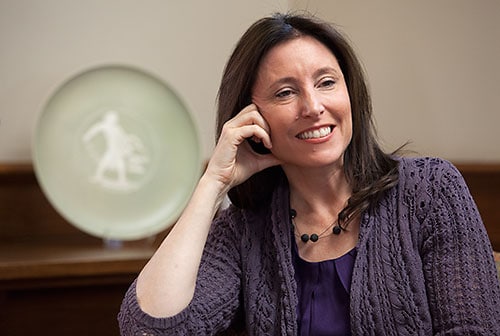New president looks to build leadership, healthy discourse

“I was in no way on the path to become a college president,” Scripps College’s new head administrator Lara Tiedens said.
She had stepped into an administrative role, senior associate dean of ac
“Most faculty members don’t think of themselves becoming a college president—it’s not the plum,” she said. “The focus is on research and teaching.”
Her view changed this past Spring when she was contacted by Scripps College.
She admired the consortium model, with Scripps able to draw resources and support from other undergraduate colleges—Pomona, Claremont McKenna, Harvey Mudd and Pitzer. She also felt connected with the school’s philosophical aims. “I think a liberal arts is really the preeminent form of undergraduate education,” she said.
Ms. Tiedens was also drawn to the school’s unique environment.
“A lot of people wonder how women have made so much progress and yet stalled. It’s clear we’re not at full equality,” she said. “A women’s college like Scripps provides a home base for women to have a place where they know women are the focus—that their challenges and interests are a priority.
That home base should give students and opportunity for leadership, according to Ms. Tiedens, as well as “an opportunity to find their voice in a place that will amplify it.” The aim is for graduates to enter the world with a strong sense of self as well as a commitment to justice.
Ms. Tiedens was already sold on the college when she visited Scripps in April. The hand of Ellen Browning Scripps—the reporter, adventurer, suffragist, businesswoman and philanthropist who founded the school—can be seen everywhere.
“She wanted to create a college where the beauty would lead to contemplation,” the administrator said.
Ms. Tiedens, Scripps’ 9th president, started her new gig on August 1. It’s been less than two months, but she already has her favorite spots on campus.
She spends a lot of time in her office, so one is a stone courtyard that adjoins her headquarters. Another preferred nook is the Margaret Fowler Garden, where she sometimes takes phone calls. It’s a Medieval-style cloister garden featuring a trickling fountain, a vine-covered colonnade and a mural across the south wall.
Ms. Tiedens may have had a touch of déjà vu when she came to town because she lived in Claremont for a year as a child. Now, she’s seeing the town, and her campus, though the eyes of her children.
The new president’s family, including her husband Dale Miller, her 12-year-old daughter and her son, nearly 3, happily are ensconced on campus in the Revelle house.
“My son has a gigantic yard in all possible directions and we have access to the dining hall. The food at Scripps is wonderful,” she said. “And my daughter is excited to be here. There are so many lectures and concerts and events designed for students that are right up her alley.”
The sense of solidarity provided by the Claremont University Consortium is right up Ms. Tiedens’ alley. “It’s a very collegial group. It’s the best perk of the community. It’s also fun coming in with Melvin,” she said, referring to Pitzer College’s brand-new President Melvin Oliver.
Ms. Tiedens, who holds a PhD in social psychology from the University of Michigan. One of her main areas of research has been the psychology of social hierarchies.
It seems with each new class comes an issue that Claremont Colleges students, and across the nation, become more intentional about. Two years ago, it was about bringing to light the problem of sexual assault on college campuses, and petitioning schools to offer greater support and justice for victims.
This year, marked by numerous shootings of black men and women by police officers across the country and by the #BlackLivesMatter movement, race is a hot-button issue.
Earlier in the year, a Pitzer College student’s request for non-white roommates made national news. Many students supported her request, saying that being able to live in a “safe space” with people of color was a matter of self-preservation. C And at the start of the school year, Pomona College students were greeted by handwritten posters advising them how be “a white ally.”
Some say today’s young people s are oversensitive—that it is absurd or offensive for students at schools like Pitzer and Pomona, which are widely considered liberal student body—to say they are under attack.
Ms. Tiedens said it’s important to examine the students’ actions within the larger context of society.
“Thedemographic patterns in the US are changing. The media plays an important role. People have more contact with the world as a whole,” she said. “At one time, students were able to kind of live in their own bubble. Now they are much more connected with what’s happening in the world.”
She pointed to the recent spate of shootings, caught on video and attesting to an engrained problem in law enforcement. When a student of conscience sees things like racism and violence, Ms. Tiedens says it prompts many questions.
“Students say “That’s not the world I want to live in.” They first look at their immediate context and say, ‘Is it just and is it fair,” she said.
The president feels a college can help students to navigate difficult topics of discussion.
She’s pleased to announce Scripps’ new ConverActions (Conversations to Action) series, where students and faculty examine thorny or intractable issues, often in the wake of a guest speaker’s talk. Last week discussion centered on a recent presentation by hip-hop historian Jeff Chang, “We Gon’ Be Alright, Notes on Race and Resegregation.”
Meanwhile, Ms. Tiedens is ramping up to working on the school’s strategic plan, a 10-year vision for the maintenance and growth of Scripps College. Her first task is to learn about the school thoroughly and in-depth.
“I will want the impact I have to be very influenced by the intricate detail of what Scripps is and where the passions already are,” she said.
—Sarah Torribio
storribio@claremont-courier.com










0 Comments